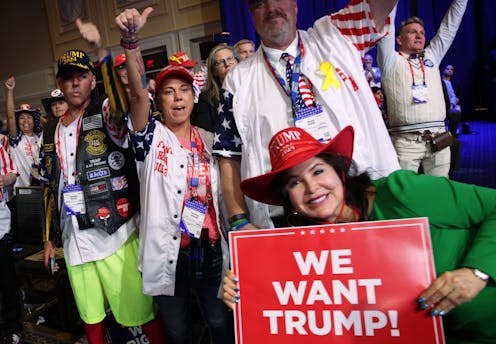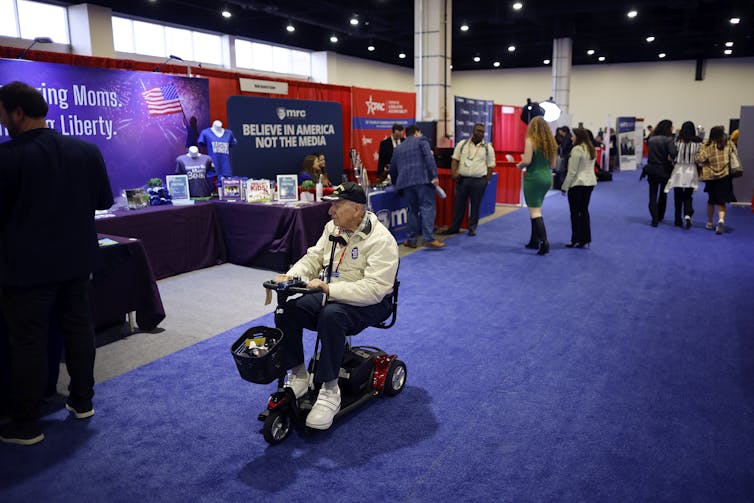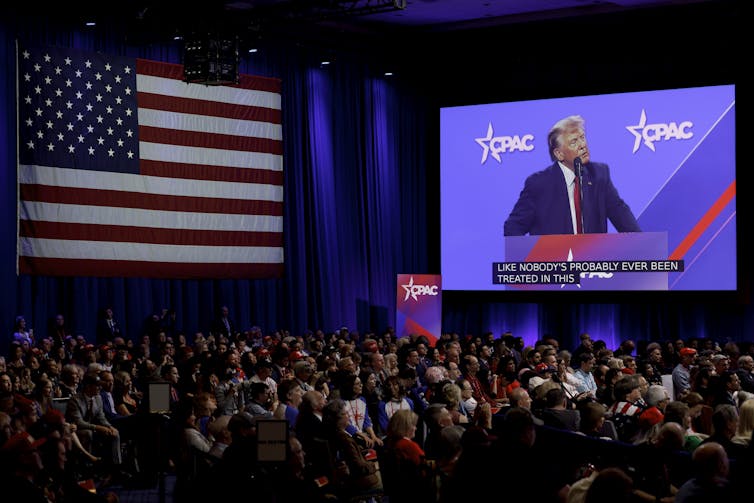
In early March 2023, I mixed with the Make America Great Again faithful at the annual Conservative Political Action Conference – a popular meeting, often known as CPAC, for conservative activists and political figures.
I walked, ate and sat with the attendees at the National Harbor in Maryland over the course of four days. Many of them were dressed in MAGA and pro-Trump gear such as sequined hats and shirts that said things like “Trump won” the 2020 election. A few had tattoos of Trump’s face.
Media reports show that CPAC, which did not publicize the number of attendees, had lower-than-normal attendance and fewer high-profile sponsors.
Approximately 62% of CPAC attendees participating in a straw poll said they support Donald Trump for president in 2024.
Understanding CPAC
Many commentators and others have labeled CPAC extremist. The program was loaded with sometimes incendiary figures reviled by the left, including Republican Reps. Marjorie Taylor Greene and Matt Gaetz, as well as former Trump political advisers Steve Bannon and Stephen Miller.
I am a scholar of extremism in the United States and went to CPAC for two reasons. First, I wanted to hear firsthand what conservatives, and especially Trump followers, said. At a time of high political polarization, it is important to understand different positions.
Second, almost half of people in the U.S. fear political violence and civil war. I wanted to take the pulse of the conservative right and assess points of division ahead of the 2024 presidential election.
The conference’s theme was “Protecting America Now.” Who and what were the perceived threats? And, amid the polarization, was there any common ground shared by conservatives and liberals?
I discovered five frequent demons at the conference: there were China’s Communist Party and border criminals – including Mexican drug cartels and undocumented immigrants. “Radical left Marxists” and the ideologies of “wokism” and “transgenderism” were also frequent targets.
While I also found a few glimmers of hope for political common ground between the left and right, it was apparent that Trumpism – and the election denial, misinformation and scapegoating that come with it – is stronger than some think and, I believe, remains a threat to U.S. democracy.

China
China was one of the biggest common enemies identified at the conference. Just days after senior U.S. intelligence officials said that China is the United States’ biggest national security threat, speaker after speaker at CPAC harped on this theme.
The first day included panels titled “Caging the Red Dragon” and “No Chinese Balloons Above Tennessee.”
Such language plays to the growing number of Americans who view China as the country’s biggest enemy.
Border criminals
The focus on China connected to another target at the conference – Mexican cartels that engage in human and drug trafficking. This includes groups that bring fentanyl – a drug that is Chinese-manufactured or made from Chinese-produced chemicals – into the U.S.
Many speakers accurately noted the staggering number of fentanyl deaths in the U.S., including over 100,000 overdose deaths in 2021. But they did so in often apocalyptic terms.
They were quick to blame the Biden administration, ignoring that these issues have a long history and also existed under former President Donald Trump.
The crisis, CPAC speakers said, includes large numbers of undocumented migrants crossing the border – who they sometimes derogatorily referred to as “illegal aliens.” Oddly, those crossing the border were depicted both as victims of the violent cartels and as criminal and economic threats to Americans.
American Marxism
CPAC speakers and attendees spotlighted what they saw as equally dire demons lurking within the country.
“Radical leftist Marxists” – a stand-in for all Democrats – stood at the top of the list. These leftist radicals, CPAC speakers suggested, were intent on turning the U.S. into a socialist country like China in which the state controlled bodies and minds and quashed individual rights and freedoms.
The Democratic Party “hates this country,” Fox TV personality Mark Levin claimed on the CPAC stage.
“This American Marxist movement,” he continued, his voice raising, “took off big time during COVID” and then “rode the wave of Black Lives Matter, Antifa and the cop-hating, to advance this racist, Marxist, bigoted, socialist, anti-American agenda – which is everything today the Democrat Party today stands for!”
The crowd responded with loud applause and cheers – ignoring that these often repeated claims have little basis in reality.
Wokism
This anti-American agenda, Levin and other CPAC speakers argued, was illustrated by “wokism.”
Being woke generally means understanding societal issues like racial and social justice. But CPAC speakers, who didn’t define the term, suggested that these efforts were really part of a “radical leftist” plot to control what people think and say – an idea that the right has derided as “political correctness” in the past.
‘Transgenderism’
There was also an emphasis on gender and the perceived threat of transgender people. Some of the anti-transgender sentiment was casual, such as when Rep. Gaetz quipped, “We had to spend four, five days asking the Chinese spy balloon what its pronouns were before we were willing to shoot it down.”
Perhaps the most strident remarks were made by conservative political commentator Michael Knowles, who stated, “for the good of society … transgenderism must be eradicated from public life entirely.”
Despite his inflammatory language and use of “transgenderism,” a derogatory term suggesting that transgender people have “a condition,” Knowles received loud applause.
So, too, did other speakers who disparaged transgender identity – an issue that has become a culture wars flashpoint.
The Anti-Defamation League, among other human rights groups, has shown that the idea transgender people are predatory “groomers” or pedophiles is false and is being circulated by some Republicans only for political gain.
In March 2023, Tennessee became the first state to pass a law that restricts drag performances in the presence of children – a move that likely violates the First Amendment’s free speech protection and, in my view, is based on fear, not facts. Other Republican-led states are considering anti-drag legislation.

The warrior
By the time Trump took the stage, the CPAC crowd was primed. People danced and waved “TRUMP WAS RIGHT!” placards.
Trump offered an apocalyptic vision of the country’s future.
“Sinister forces” are seeking to turn the U.S. into a “lawless open-borders, crime-ridden, filthy, communist nightmare,” Trump said.
Trump promised to fight back against these forces. “I am your warrior,” he told the adoring crowd. “I am your justice.”
The rocky ride ahead
I went to CPAC to find areas where the left and right might find common ground. Both sides worry about issues like inflation, fentanyl and crime. And, even as they may disagree on the path to get there, both want a better future for the country.
But politics is another demon lurking in the room. Most of the speakers at CPAC seemed to be there to rile up the crowd, which included many activists.
This was especially true of Trump, whose divisiveness was on clear display at CPAC.
All of this suggests the U.S. faces a rocky ride to the upcoming 2024 election.
Alexander Hinton receives funding from The Center for Politics and Race in America at Rutgers University-Newark.
This article was originally published on The Conversation. Read the original article.







